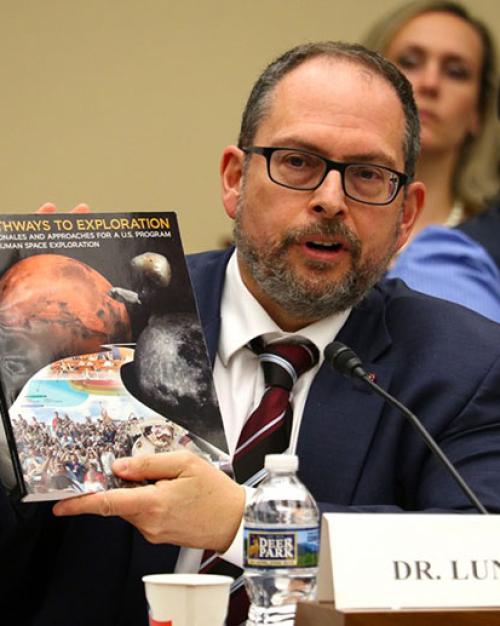Cornell astronomer Jonathan Lunine suggested to Congress reasonable, practical steps – including baby steps back to the moon – to help Americans one day put boots on the oxidized dust of Mars.
At the May 8 hearing before the House Subcommittee on Space and Aeronautics, “Keeping Our Sights on Mars: A Review of NASA’s Deep Space Exploration,” Lunine outlined basic, smart approaches to putting humans on our red neighboring planet, based on a National Academies report he co-chaired in 2014, “Pathways to Exploration: Rationales and Approaches for a U.S. Program of Human Space Exploration.”
Make Mars the horizon goal for human spaceflight, with the moon an intermediate destination, Lunine told the House members. He said international partnerships are crucial to such long-range endeavors, and currently immature technologies must be developed for: a spacecraft’s entry, descent and landing; advanced in-space propulsion and power; and radiation safety.
“We must be in it for the long haul,” said Lunine, the David C. Duncan Professor in the Physical Sciences and director of the Cornell Center for Astrophysics and Planetary Science. “An Apollo-style sprint to the moon – in and of itself – is not a stepping stone” to Mars.
If the U.S. wants to undertake a program of deep space exploration, he said, there must be a long national commitment.
“Good political support requires a steady cadence of successes, so that taxpayers can see a return on their investment in a short-enough time for the relationship between an investment and payoff to be clear,” Lunine said. “It is precisely that approach which … [when] used in timely manner, will assure that Americans will return to the moon and one day walk on the red soil of Mars.”
Lunine joined William Gerstenmaier, NASA associate administrator for human exploration and operations; Mark Sirangelo, NASA special assistant to the administrator; and others to testify before the full subcommittee, which is chaired by Rep. Kendra Horn (D-Oklahoma.)
During questions, Rep. Pete Olson (R-Texas), whose district is suburban Houston, wanted details on important factors that scientists and engineers would need to work out in the leap from a lunar mission to a Mars project. Lunine said that shielding astronauts from radiation, environmental control and life-support systems for long-term stays on the moon will be directly applicable to Mars.
Lunine addressed questions from Rep. Don Beyer (D-Virginia) about international collaborations and the long-term sustainability of humanity.
“We recognize the realities of humans living entirely independently on a planet as inhospitable as Mars,” Lunine said, acknowledging that making humans a two-planet species is aspirational. “I don’t think anybody is under the misapprehension that putting a base on Mars, we would avoid human extinction should our home planet [experience] catastrophe. The Mars colony would also go away.”
Keeping Earth healthy is critical to human success. Said Lunine: “We must take care of our own planet, in order to survive as a species. But in living on another planet, it will change our perspective as a species and lead to a future that we might not otherwise imagine.”
This story also appeared in the Cornell Chronicle.




